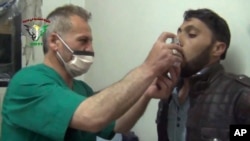The U.N. Security Council on Tuesday began discussing potential consequences for the Assad regime and the Islamic State for their illegal use of chemical weapons in Syria.
The discussions focused on a report by the Organization for the Prohibition of Chemical Weapons’ Joint Investigative Mechanism. The special panel examined nine attacks in seven different parts of Syria that occurred in 2014 and 2015, and it concluded that there was enough evidence to attribute two chlorine gas attacks to the government and a sulfur mustard gas attack to the IS terror group.
As for the other six cases the JIM looked at, members of the group said they could not say definitively who had carried out the attacks, or whether chlorine was used. In three of the attacks, the panel said, further investigation would be useful.
“The Syrian regime has been found to have used chlorine gas against civilians in Syria, and that is a war crime,” said British Ambassador Matthew Rycroft. “Everyone responsible for those war crimes must be held accountable and dealt with accordingly.”
Sarin attack in 2013
In August 2013, more than 1,000 civilians were killed in a sarin gas attack on an opposition-controlled area of Ghouta, a suburb of Damascus. Under intense international pressure, the Damascus government then agreed to declare and give up its chemical weapons stockpiles.
As part of the deal, Syria also signed on to the 1997 Chemical Weapons Convention, which forbids the use of chlorine as a weapon.
According to the U.N. resolution dismantling Syria’s chemical weapons, the Security Council can impose “measures” including targeted sanctions on parties who violate the provisions of the resolution.
“The JIM report closely establishes responsibilities with respect to the use of chemical weapons in Syria,” French Ambassador François Delattre told reporters.
“France favors a quick and strong Security Council response,” he added, including imposing sanctions on the perpetrators of the attacks.
U.S. Ambassador Samantha Power said there needs to be “meaningful accountability,” especially in light of continuing reports of chemical attacks.
But Russian envoy Vitaly Churkin expressed skepticism about the Damascus government’s involvement in the two chlorine attacks attributed to it, saying that while “there is a smoking gun” of chlorine, “there are no fingerprints on the gun.”
Churkin said a number of questions must be clarified before Moscow can accept the panel’s findings. However, he did accept the report's conclusion that IS carried out a mustard gas attack.
Syria’s U.N. ambassador, Bashar Ja’afari, rejected the panel’s findings against his government and said Damascus would continue its own investigation of all the incidents.
Human rights groups urged the council to impose sanctions on the perpetrators and to refer the situation to the International Criminal Court at The Hague.




